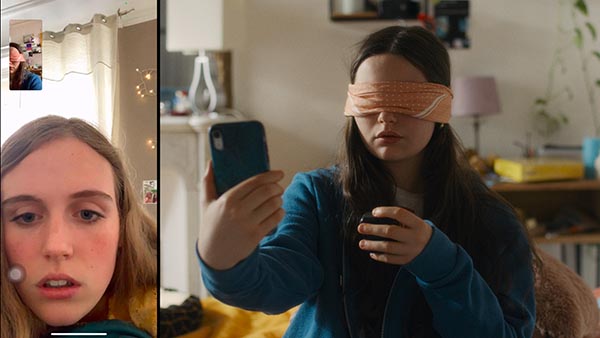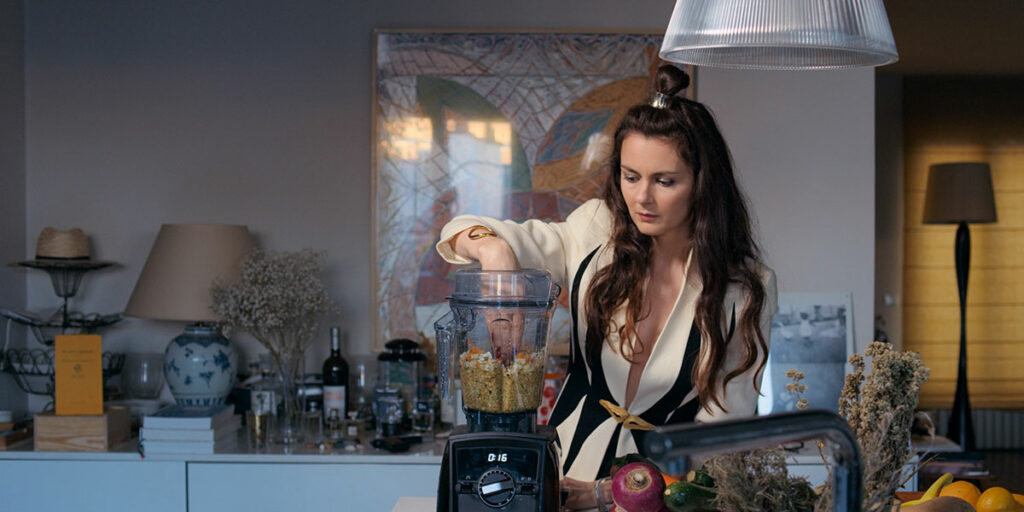Bertrand Bonello’s Coma delves into the mind of a teenage girl, bored senseless by France’s Covid lockdown, in a hectic stripped-down time capsule.
Coma follows a teenager we know as ‘Young Girl’ (Louise Labèque, Zombi Child), who, understandably bored in lockdown, stumbles upon an idiosyncratic YouTuber called Patricia Coma (Julia Faure, Process). With all this free time, she consumes a lot of Patricia’s content, and becomes increasingly influenced by this histrionic, eccentric figure. Bertrand Bonello is an unpredictable filmmaker, and Coma is his contribution to the ‘lockdown film’ trend, which saw filmmakers rise to the challenge to make a film with limited resources and while adhering to the strict rules imposed by their governments. Doug Liman made Locked Down, a far cry from his usual action/thriller tendencies, and Rob Savage directed Host, a hugely successful Zoom ghost story. Bonello, who always tries new things, seems like a perfect candidate for the challenge.
The character of Patricia Coma is a means of satirising Internet celebrities. They’re not really that much different from other celebrities, but they have a more direct line, through social media, to young people, and they’ve had to be more savvy in rising to fame, as it is largely through cultivating an audience themselves rather than being thrust into the limelight. Patricia is smart, and that’s why she’s potentially dangerous. She uses her platform to sell a toy which challenges players to press coloured buttons in increasingly complex sequences, and our protagonist buys it. Soon, she gets bored of it, and seeks more stimulation. To retain viewership, Patricia engages in increasingly crazy stunts, and you can quite quickly see where this is going.
Patricia Coma creates a character, a narrative if you will, in her online persona, which we all do when we post to Instagram or BeReal. When talking to her friends over Zoom, the main character, Young Girl, code-switches to the appropriate register, as we all do, and the group discuss their favourite serial killers – a conversation I’ve heard many people have in real life. The sequences in a doll’s house, which play out like a smutty sitcom, are only figments of an imagination, and the animated sequences also posit that life could be better than how it is now. Unfortunately, as these scenes in the doll’s house go on, they just descend into shock value.

What is Bonello arguing? I say that his message is in line with the old adage of ‘the devil makes work for idle hands’, and perhaps he is responding to the moral panic of allowing teenagers unrestricted Internet access. The mix of filmmaking styles illustrate how different people experience lockdown differently; for extroverts like myself, it was horrendous, but for those whose imaginations thrive when alone, it could have been a blessing. Coma is a peculiar film, which begins and ends with Koyaanisqatsi-esque montages backed by philosophical narration, and features an array of styles, including stop-motion and Zoom interfaces. Bonello insists that the film is above all a ‘gift’.
Coma will serve as a document, along with films such as Dashcam and Malcolm and Marie, that will be useful in showing future generations how life was impacted during lockdown, and it features contemporary cultural references, such as a doll quoting Donald Trump (who, love him or hate him, has probably contributed the most phrases and memes to our cultural vernacular than any other living figure). The narration that bookends the film’s events display an awareness that we are finite, and thus, time in lockdown was eventually going to end, even if some of us didn’t live to see it end. Cinema is a means of storytelling, and lockdown, like any stimuli, forced creatives to think of new ways to express themselves, and like anything, the results can vary.
Unfortunately, I just didn’t find that Coma amounted to much. There are certainly some interesting ideas, but even over the course of only 80 minutes, it started to wear thin quickly, and its occasional moments of Haneke-esque shock value just seemed like desperate attempts to gain attention. It’s certainly inspired, but I believe its concepts would work better as self-contained short films. However, it definitely works as a reflection of an Internet-raised youth’s mind during a period of intense quarantine, and I (19 when lockdown first hit) could relate to Young Girl’s restlessness and thirst for stimulation. While it’s probably less than the sum of its parts, Coma is worth checking out if you want to be reminded of the drudgery of lockdown. Which, come to think about it, perhaps you may not.
Coma premiered at the 2022 BFI London Film Festival on October 5, 2022.

